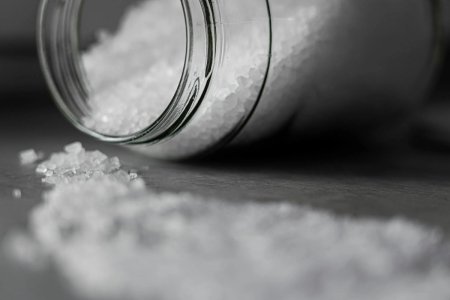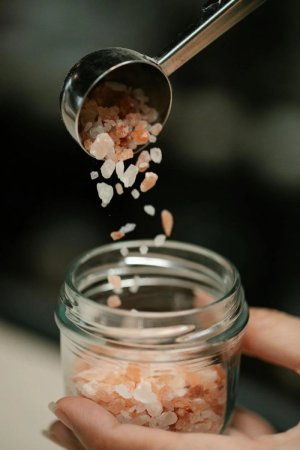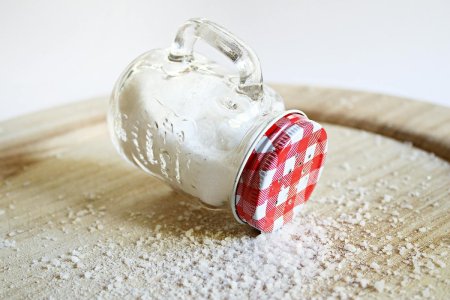Are you at risk? The surprising return of iodine deficiency could affect YOU!
By
Veronica E.
- Replies 0
In a world where health trends shift constantly, it's easy to believe that some issues are things of the past—problems no longer relevant today.
However, recent reports are bringing to light a startling resurgence of a condition once thought to be under control: iodine deficiency. This condition, which many considered to be a relic of history, could be affecting you or someone you know.
Here The GrayVine, we’re shedding light on this issue, as it’s one that deserves our attention.
As we uncover the reality behind this growing health concern, it's clear that iodine deficiency is a challenge we can no longer afford to ignore.

The Forgotten Nutrient: Iodine's Role in Our Health
Iodine, a trace element, is crucial for proper thyroid function, which in turn regulates metabolism, growth, and development. It’s especially vital for brain development in children.
Despite its importance, iodine often doesn't make the headlines in nutrition discussions.
A common sign of iodine deficiency is the development of a goiter, an enlargement of the thyroid gland that causes noticeable swelling in the neck.
But there’s more to it—severe iodine deficiency, especially in childhood, can lead to developmental delays and intellectual disabilities, once referred to as "cretinism."

The Salt Solution: A Historic Victory Over Iodine Deficiency
In the early 1900s, the U.S. faced widespread iodine deficiency, especially in regions known as the 'goiter belt' stretching from the Great Lakes to the Pacific Northwest. The simple yet brilliant solution? Adding iodine to table salt.
By the mid-20th century, iodized salt became a household staple, and iodine deficiency rates dramatically decreased.
However, our modern diets have changed dramatically. Processed foods, which dominate many American diets, often contain non-iodized salt. Trendy options like sea salt or Himalayan pink salt, while popular, typically don't contain iodine.
Even the bread industry, once a major source of iodine, has moved away from fortifying with this essential nutrient.

The Resurgence: Iodine Deficiency in the Modern Age
Now, a troubling trend is emerging. Doctors are reporting a rise in iodine deficiency, particularly among vulnerable groups. Pregnant women and children are most at risk.
The American Academy of Pediatrics recommends that pregnant and breastfeeding women consume 150 micrograms of iodine daily, which is easily achievable with iodized salt.
Unfortunately, many prenatal vitamins lack iodine, and dietary restrictions only increase the risk.
The consequences of iodine deficiency are not trivial. Even mild deficiency during pregnancy has been linked to lower IQs and language delays in children.

While the exact threshold for these issues is still debated, the potential impact on cognitive development is too significant to ignore.
What Can You Do? Taking Action Against Iodine Deficiency
The resurgence of iodine deficiency should serve as a reminder for all of us to pay attention to our diets. Here's what you can do to protect yourself and your loved ones:
1. Understand Your Salt: Make sure the salt you use at home is iodized. Don't assume that all salts contain iodine—check the labels!
2. Read Your Labels: If you're pregnant or breastfeeding, ensure your prenatal vitamins contain iodine. If not, speak to your healthcare provider about adding a supplement.
3. Diversify Your Diet: Include iodine-rich foods like seafood, dairy products, eggs, and seaweed, which is particularly rich in iodine.
4. Stay Informed: As our food systems evolve, so do our nutritional needs. Keep up-to-date with the latest recommendations on iodine and nutrition.
5. Talk to Your Doctor: If you have dietary restrictions or health concerns that could affect your iodine intake, seek personalized advice from a healthcare professional.
As we’ve seen, iodine deficiency may not be as distant a concern as we once thought, and its potential effects on health, especially in vulnerable groups, are too significant to overlook.
By staying informed, making conscious dietary choices, and consulting with healthcare professionals, we can take proactive steps to protect ourselves and our loved ones.

Have you or someone you know been affected by iodine deficiency? Were you surprised to learn about its resurgence? Do you have tips for adding more iodine to your diet? We invite you to share your experiences and ideas in the comments below. Together, we can make sure that iodine deficiency doesn't make a comeback!
However, recent reports are bringing to light a startling resurgence of a condition once thought to be under control: iodine deficiency. This condition, which many considered to be a relic of history, could be affecting you or someone you know.
Here The GrayVine, we’re shedding light on this issue, as it’s one that deserves our attention.
As we uncover the reality behind this growing health concern, it's clear that iodine deficiency is a challenge we can no longer afford to ignore.

A sprinkle of iodized salt can help support your thyroid and overall health. Image Source: Pexels / Castorly Stock.
The Forgotten Nutrient: Iodine's Role in Our Health
Iodine, a trace element, is crucial for proper thyroid function, which in turn regulates metabolism, growth, and development. It’s especially vital for brain development in children.
Despite its importance, iodine often doesn't make the headlines in nutrition discussions.
A common sign of iodine deficiency is the development of a goiter, an enlargement of the thyroid gland that causes noticeable swelling in the neck.
But there’s more to it—severe iodine deficiency, especially in childhood, can lead to developmental delays and intellectual disabilities, once referred to as "cretinism."

Be on the lookout for signs of iodine deficiency—an enlarged thyroid, known as a goiter, may appear in the neck area. Image Source: Pexels / Olha Ruskykh.
The Salt Solution: A Historic Victory Over Iodine Deficiency
In the early 1900s, the U.S. faced widespread iodine deficiency, especially in regions known as the 'goiter belt' stretching from the Great Lakes to the Pacific Northwest. The simple yet brilliant solution? Adding iodine to table salt.
By the mid-20th century, iodized salt became a household staple, and iodine deficiency rates dramatically decreased.
However, our modern diets have changed dramatically. Processed foods, which dominate many American diets, often contain non-iodized salt. Trendy options like sea salt or Himalayan pink salt, while popular, typically don't contain iodine.
Even the bread industry, once a major source of iodine, has moved away from fortifying with this essential nutrient.

While trendy options like Himalayan salt may look appealing, they typically lack the essential iodine found in iodized salt. Image Source: Pexels / Sarah Chai.
The Resurgence: Iodine Deficiency in the Modern Age
Now, a troubling trend is emerging. Doctors are reporting a rise in iodine deficiency, particularly among vulnerable groups. Pregnant women and children are most at risk.
The American Academy of Pediatrics recommends that pregnant and breastfeeding women consume 150 micrograms of iodine daily, which is easily achievable with iodized salt.
Unfortunately, many prenatal vitamins lack iodine, and dietary restrictions only increase the risk.
The consequences of iodine deficiency are not trivial. Even mild deficiency during pregnancy has been linked to lower IQs and language delays in children.

Iodine is crucial for the healthy development of children and supports proper thyroid function during pregnancy. Image Source: Pexels / Pixabay.
While the exact threshold for these issues is still debated, the potential impact on cognitive development is too significant to ignore.
What Can You Do? Taking Action Against Iodine Deficiency
The resurgence of iodine deficiency should serve as a reminder for all of us to pay attention to our diets. Here's what you can do to protect yourself and your loved ones:
1. Understand Your Salt: Make sure the salt you use at home is iodized. Don't assume that all salts contain iodine—check the labels!
2. Read Your Labels: If you're pregnant or breastfeeding, ensure your prenatal vitamins contain iodine. If not, speak to your healthcare provider about adding a supplement.
3. Diversify Your Diet: Include iodine-rich foods like seafood, dairy products, eggs, and seaweed, which is particularly rich in iodine.
4. Stay Informed: As our food systems evolve, so do our nutritional needs. Keep up-to-date with the latest recommendations on iodine and nutrition.
5. Talk to Your Doctor: If you have dietary restrictions or health concerns that could affect your iodine intake, seek personalized advice from a healthcare professional.
As we’ve seen, iodine deficiency may not be as distant a concern as we once thought, and its potential effects on health, especially in vulnerable groups, are too significant to overlook.
By staying informed, making conscious dietary choices, and consulting with healthcare professionals, we can take proactive steps to protect ourselves and our loved ones.
Key Takeaways
- Doctors are concerned about the resurgence of iodine deficiency, a dietary issue once thought to be a thing of the past.
- Iodine is essential for regulating metabolism and is crucial for brain development in children, with deficiency leading to symptoms such as goiter.
- Changes in diet and food manufacturing have led to decreased iodine intake, as processed foods often contain non-iodized salt, and many bread brands no longer add iodine.
- Experts recommend that pregnant and breastfeeding women ensure they get adequate iodine through diet or supplements, as deficiency can affect children's IQ and language development.
Have you or someone you know been affected by iodine deficiency? Were you surprised to learn about its resurgence? Do you have tips for adding more iodine to your diet? We invite you to share your experiences and ideas in the comments below. Together, we can make sure that iodine deficiency doesn't make a comeback!






